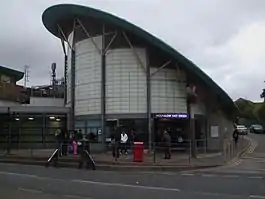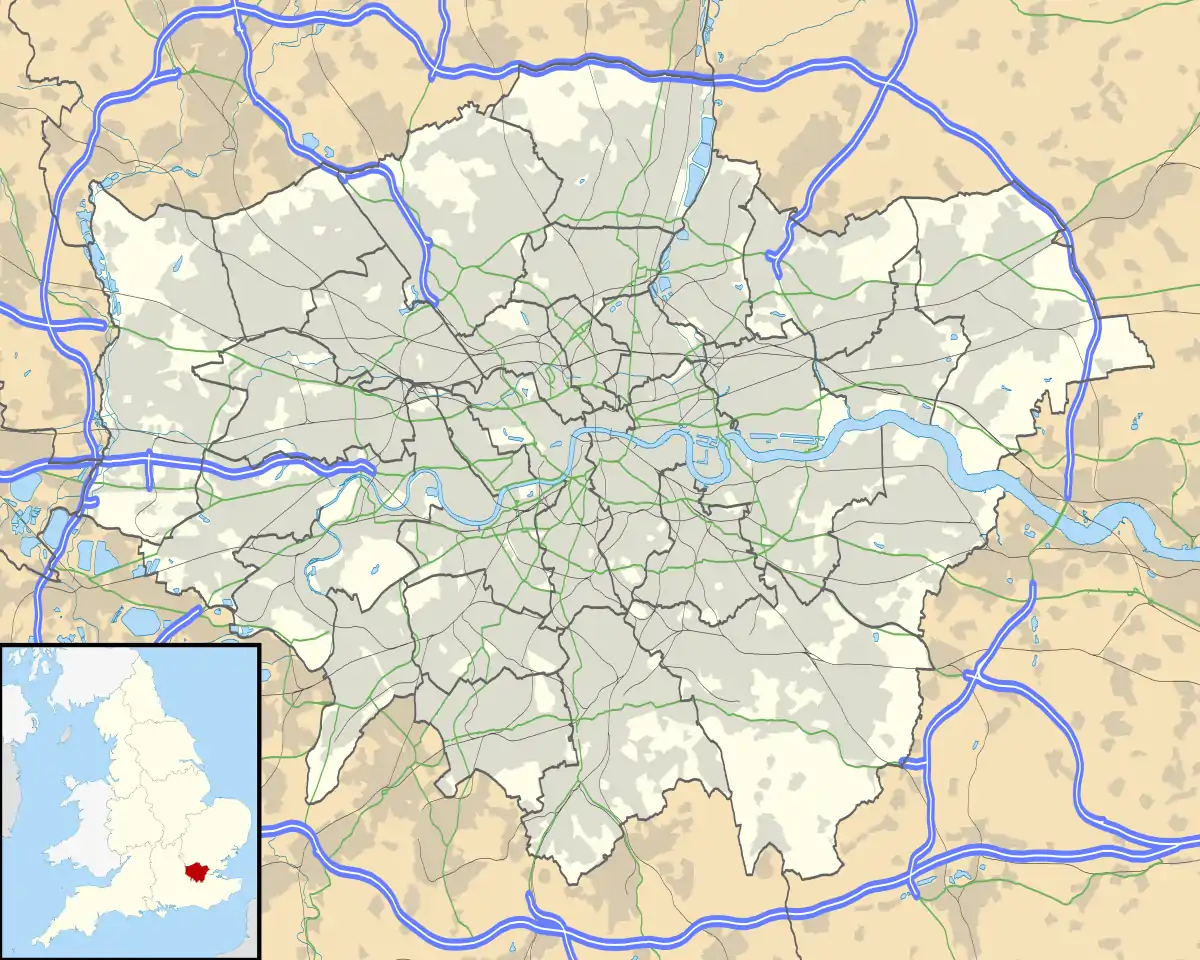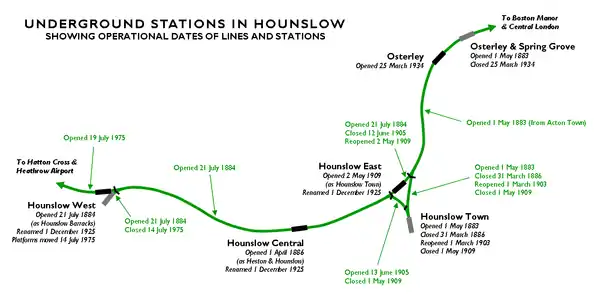Hounslow East tube station
Hounslow East is a London Underground station in Hounslow in west London designed by Acanthus LW Architects.
| Hounslow East | |
|---|---|
 Station entrance | |
 Hounslow East Location of Hounslow East in Greater London | |
| Location | Hounslow |
| Local authority | London Borough of Hounslow |
| Managed by | London Underground |
| Number of platforms | 2 |
| Accessible | Yes[1] |
| Fare zone | 4 |
| London Underground annual entry and exit | |
| 2015 | |
| 2016 | |
| 2017 | |
| 2018 | |
| 2019 | |
| Key dates | |
| 21 July 1884 | Track laid (DR) |
| 2 May 1909 | Opened (District line) |
| 13 March 1933 | Start (Piccadilly line) |
| 9 October 1964 | End (District line) |
| Other information | |
| External links | |
| WGS84 | 51.4730°N 0.3563°W |
The station is on the Heathrow branch of the Piccadilly line, between Hounslow Central and Osterley. The station is located on Kingsley Road about 400m north of Hounslow High Street. Hounslow Bus Garage (the main bus terminus) is a short walk to the south. It is in Travelcard Zone 4.
History
The route through Hounslow East station was opened by the District Railway (DR, now the District line) on 21 July 1884 as a branch to Hounslow Barracks (now Hounslow West). The branch line was constructed as single track from the DR's existing route to Hounslow Town station located at the eastern end of Hounslow High Street where the bus garage is now located. That station had opened in 1883. Initially the branch to Hounslow Barracks had no stations between there and Osterley & Spring Grove (replaced by Osterley in 1934).
Hounslow Town station was closed on 31 March 1886 and Heston & Hounslow station (now Hounslow Central), opened as its replacement the following day, 1 April 1886.
In 1903 Hounslow Town station was reopened and trains would be divided at Osterley & Spring Grove station, with part running to Hounslow West and the other part to Hounslow Town as a short shuttle. Electrification of the DR's tracks took place between 1903 and 1905 with electric trains replacing steam trains on the Hounslow branch from 13 June 1905. When the branch was electrified, the track between Osterley & Spring Grove station and Hounslow Central was closed and a new loop was opened from Hounslow Town back to Hounslow Central. Trains would run from Osterley to Hounslow Town then reverse and run over the new loop to reach the main line and so continue to Hounslow West.[5][6]

This method of operation was unsuccessful and short-lived. On 2 May 1909 the track between Heston & Hounslow station (now Hounslow Central) and Osterley & Spring Grove station was reopened with Hounslow East station (initially called Hounslow Town) as a new station located about 300 m (350 yd) west of the loop to the old station. The old Hounslow Town station and its two loop tracks were closed for good.[5][7] Part of the embankment that carried the original single track to Hounslow Town Station (now Hounslow Bus garage) is still visible, just east of Hounslow East station.
On 1 December 1925 the station was given its present name at the same time that Hounslow West and Hounslow Central received their current names.
Piccadilly Line services, which had been running as far as Northfields since January 1933 were extended to run to Hounslow West on 13 March 1933. From this date, the branch was operated jointly by both lines until District Line services were withdrawn on 9 October 1964.
New station buildings, to designs by Acanthus Lawrence and Wrightson Architects, have now replaced the old ones . Phase 1 of the scheme, which was completed in July 2002, required the excavation of the existing embankment and provided a new ticket hall with ancillary staff accommodation, interchange passageway and stairs to each platform. The second phase which involved the construction of the eastbound platform building, with a striking green roof,[8] completed early 2003. As part of the works lifts have been provided to both platforms.
Staff frequently play classical music on the PA system as part of an experiment to discourage anti-social activities at the station.[9]
Connections
London Buses routes 111 and H28 serve the station. Hounslow Bus Station is a two-minute walk away.
References
- "Step free Tube Guide" (PDF). Transport for London. May 2020. Archived (PDF) from the original on 7 August 2020.
- "Multi-year station entry-and-exit figures (2007–2017)" (XLSX). London Underground station passenger usage data. Transport for London. January 2018. Retrieved 22 July 2018.
- "Station Usage Data" (CSV). Usage Statistics for London Stations, 2018. Transport for London. 21 August 2019. Retrieved 27 April 2020.
- "Station Usage Data" (XLSX). Usage Statistics for London Stations, 2019. Transport for London. 23 September 2020. Retrieved 9 November 2020.
- Day, John R. (1963). The Story of London's Underground (1st ed.). Westminster: London Transport. p. 81.
- Connor, Piers (1993). Going Green: The Story of the District Line. Harrow Weald: Capital Transport. p. 46. ISBN 1-85414-157-0.
- Connor 1993, p. 48
- "Hounslow East Timber Lamella Roof Structure". BM TRADA Group. 2003. Archived from the original on 22 December 2008. Retrieved 17 March 2012.
- "Labyrinth". art.tfl.gov.uk. Transport for London. Archived from the original on 16 June 2019. Retrieved 23 May 2020.
External links
| Wikimedia Commons has media related to Hounslow East tube station. |
- "Hounslow East". Photographic Archive. London Transport Museum. Archived from the original on 18 February 2014.
- "Acanthus LW Architects".
| Preceding station | Following station | |||
|---|---|---|---|---|
| Piccadilly line | towards Cockfosters |
|||
| Former services | ||||
| Preceding station | Following station | |||
towards Hounslow West | District line (1909-32) | towards Barking |
||
| District line (1932-34) | towards Upminster |
|||
| Piccadilly line (1933-34) | towards Cockfosters |
|||
| District line (1934-64) | towards Upminster |
|||